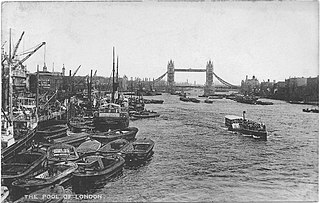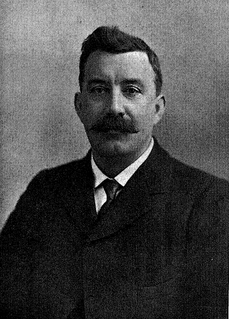Related Research Articles
The Port of London is that part of the River Thames in England lying between Teddington Lock and the defined boundary with the North Sea and including any associated docks. Once the largest port in the world, it is the United Kingdom's second largest port, after Grimsby & Immingham as of 2012. Usage is largely governed by the Port of London Authority ("PLA"), a public trust established in 1908; while mainly responsible for coordination and enforcement of activities it also has some minor operations of its own.

The Transport and General Workers' Union was one of the largest general trade unions in the United Kingdom and Ireland – where it was known as the Amalgamated Transport and General Workers' Union (ATGWU) to differentiate itself from the Irish Transport and General Workers' Union – with 900,000 members. It was founded in 1922 and Ernest Bevin served as its first general secretary.

The Pool of London is a stretch of the River Thames from London Bridge to below Limehouse.

The United States Shipping Board (USSB) was established as an emergency agency by the 1916 Shipping Act, on September 7, 1916. The United States Shipping Board task was to increase the number of US ships supporting the World War I efforts. United States Shipping Board program ended on March 2, 1934.

The National Union of Seamen (NUS) was the principal trade union of merchant seafarers in the United Kingdom from the late 1880s to 1990. In 1990, the union amalgamated with the National Union of Railwaymen to form the National Union of Rail, Maritime and Transport Workers (RMT).
The Dock, Wharf, Riverside and General Labourers Union (DWRGLU), often known as the Dockers' Union, was a British trade union representing dock workers in the United Kingdom.

The Port of Boston,, is a major seaport located in Boston Harbor and adjacent to the City of Boston. It is the largest port in Massachusetts as well as being one of the principal ports on the east coast of the United States.
The National Amalgamated Stevedores and Dockers (NASD), sometimes referred to as the National Amalgamated Stevedores' and Dockers' Society, was a trade union in the United Kingdom.

Charles George Ammon, 1st Baron Ammon, PC, DL, JP was a British Labour Party politician.
Newport Docks is the collective name for a group of docks in the city of Newport, south-east Wales.
The Vancouver Fraser Port Authority, responsible for overseeing the Port of Vancouver, Canada's largest port and the third largest in North America by tonnes of cargo, facilitating trade between Canada and more than 170 world economies. It is the principal authority for shipping and port-related land and sea use in the Metro Vancouver region. In 2014, the Port of Vancouver was the fourth largest port by tonnage in the Americas, 29th in the world in terms of total cargo and 44th in the world by container traffic. The Vancouver Fraser Port Authority was established by the Government of Canada in January 2008 and is responsible for the stewardship of the federal port lands in and around Vancouver, British Columbia. It is financially self-sufficient and accountable to the federal minister of transport and operates pursuant to the Canada Marine Act. The port authority and port terminals and tenants are responsible for the efficient and reliable movement of goods and passengers, integrating environmental, social and economic sustainability initiatives into all areas of port operations. Enabling the trade of approximately $240 billion in goods, port activities sustain 115,300 jobs, $7 billion in wages, and $11.9 billion in GDP across Canada.

Harry Gosling CH was a British Labour Party politician and trade union leader.

The Port of Albany–Rensselaer, widely known as the Port of Albany, is a port of entry in the United States with facilities on both sides of the Hudson River in Albany and Rensselaer, New York. Private and public port facilities have existed in both cities since the 17th century, with an increase in shipping after the Albany Basin and Erie Canal were built with public funds in 1825.

Alfred Short was a British trades unionist and Labour politician, Member of Parliament (MP) for Wednesbury from 1918 to 1931, and for Doncaster from 1935 until 1938.
The Melbourne Harbour Trust was established in 1877 to improve and operate port facilities for the growing city of Melbourne. It was superseded by the Port of Melbourne Authority in 1978 and later by the Port of Melbourne Corporation.

Swanson Dock is an international shipping facility in Melbourne, Victoria, Australia. It was constructed between 1966 and 1972 by the Melbourne Harbour Trust, on the north bank of the Yarra River to alleviate congestion in the port and provide the first container shipping terminal in Melbourne. It is located about 2 km downstream from the Melbourne CBD and was named after Victor Swanson, Chairman of the Melbourne Harbour Trust between 1960 and 1972.
William Devenay was a British trade unionist and politician.

The Sea Transport Branch of the British Board of Trade, originally established as the Transport Department or Naval Transport Department, was a logistical branch of the Department of Admiralty responsible for the provision of naval transportation services. It underwent numerous name changes throughout its complicated history with responsibility for sea transportation, known as the Department of the Director of Transports from 1890.

James Anderson was a British trade union leader.